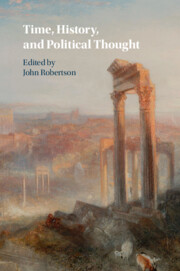Book contents
- Time, History, and Political Thought
- Time, History, and Political Thought
- Copyright page
- Contents
- Contributors
- Acknowledgements
- Note on References and the Bibliography
- Introduction: Time, History, and Political Thought
- 1 Out of Time? Eternity, Christology, and Justinianic Law
- 2 Historicity and Universality in Roman Law before 1600
- 3 ‘The Logic of Authority, and the Logic of Evidence’
- 4 Christian Time and the Commonwealth in Early Modern Political Thought
- 5 Politic History
- 6 Hobbes on the Theology and Politics of Time
- 7 The Recourse to Sacred History before the Enlightenment: Spinoza’s Theological–Political Treatise
- 8 Law, Chronology, and Scottish Conjectural History
- 9 Civilization and Perfectibility: Conflicting Views of the History of Humankind?
- 10 Kant on History, or Theodicy for Mortal Gods
- 11 Law’s Histories in Post-Napoleonic Germany
- 12 After Historicism: The Politics of Time and History in Twentieth-Century Germany
- 13 The Right to Rebel: History and Universality in the Political Thought of the Algerian Revolution
- Bibliography
- Index
4 - Christian Time and the Commonwealth in Early Modern Political Thought
Published online by Cambridge University Press: 08 June 2023
- Time, History, and Political Thought
- Time, History, and Political Thought
- Copyright page
- Contents
- Contributors
- Acknowledgements
- Note on References and the Bibliography
- Introduction: Time, History, and Political Thought
- 1 Out of Time? Eternity, Christology, and Justinianic Law
- 2 Historicity and Universality in Roman Law before 1600
- 3 ‘The Logic of Authority, and the Logic of Evidence’
- 4 Christian Time and the Commonwealth in Early Modern Political Thought
- 5 Politic History
- 6 Hobbes on the Theology and Politics of Time
- 7 The Recourse to Sacred History before the Enlightenment: Spinoza’s Theological–Political Treatise
- 8 Law, Chronology, and Scottish Conjectural History
- 9 Civilization and Perfectibility: Conflicting Views of the History of Humankind?
- 10 Kant on History, or Theodicy for Mortal Gods
- 11 Law’s Histories in Post-Napoleonic Germany
- 12 After Historicism: The Politics of Time and History in Twentieth-Century Germany
- 13 The Right to Rebel: History and Universality in the Political Thought of the Algerian Revolution
- Bibliography
- Index
Summary
Sarah Mortimer examines the impact of the Reformation on thinking about the human commonwealth within the Christian temporal and historical scheme of the Fall. From the outset Protestants sought to integrate the civil and the divine, pursuing the ideal of the godly commonwealth, while Catholics would align the commonwealth with natural law, distinct from the divine law which gave the Church its authority. With the hardening of confessional divisions, these differences were accentuated: Protestants appealed directly to Scripture for political guidance, while leading Catholics emphasised that priests and worship were essential to all forms of society. But there were also those such as Jean Bodin who sought to understand politics independently of the Christian story; others, including Francisco Suárez, began to analyse human relationships using the hypothesis of a state of nature with neither sin nor grace. These attempts to stretch and even hypothetically step outside the scheme of the Fall in turn informed the thinking of Hugo Grotius in the first half of the seventeenth century, and the chapter ends with an extended assessment of his reflections on the relation between commonwealth and churches, and his increasing acceptance of diversity in the civil sphere.
Keywords
- Type
- Chapter
- Information
- Time, History, and Political Thought , pp. 84 - 101Publisher: Cambridge University PressPrint publication year: 2023

